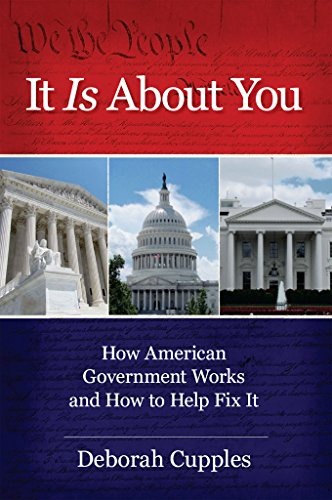It Is About You received a 4+ star review, making it an IndieReader Approved title.
Following find an interview with author Deborah Cupples.
What is the name of the book and when was it published?
It Is About You: How American Government Works and How to Help Fix It (December 2017).
What’s the book’s first line?
“The Rule of Law protects people’s rights by defining government’s powers through laws.”
What’s the book about? Give us the “pitch”.
Knowledge brings power—the power to not be duped and the power to have a say.
IT IS ABOUT YOU… is a nonpartisan, plain-language guide to how government works and explains ways that you can have some influence over government’s impact on your life.
What inspired you to write the book? A particular person? An event?
In 2017, America woke up. Enormous numbers of people began scrutinizing our government and speaking out thunderously.
I was amazed because I hadn’t seen anything like it.
It was obvious that many social-media posters knew something about government, but few grasped enough of the basics—like constitutional rights, checks and balances, the legislative process…. People’s lack of knowledge was evident across the political spectrum.
I realized that people who lack knowledge are ripe for duping and for undermining their own best interests. I wrote IT IS ABOUT YOU… to help people (1) avoid being duped and (2) empower themselves to have a say.
What’s the main reason someone should really read this book?
To gain knowledge and empower themselves.
When did you first decide to become an author?
In the early 2000s, I started writing newspaper guest columns, which interested me in writing nonfiction.
Is this the first book you’ve written?
No. I’ve co-authored two legal-academic books (West).
What do you do for work when you’re not writing?
I’m a professor at a law school.
How much time do you generally spend on your writing?
If I’m working on a project over the summer, 6-8 hours per day. If during fall or spring semester, I write an hour or two a day, a few days a week (a bit more on weekends). Because of my job, I am not always working on a writing project.
What’s the best and the hardest part of being an indie?
Being new to Indie status, I’m not sure yet.
Would you go traditional if a publisher came calling? If so, why?
I’m not sure that I would because traditional publishers don’t often contractually obligate themselves to do heavy (costly) marketing, meaning that authors have to do much of their own marketing. Also, authors tend to make less money per book with traditional publishers. It seems logical that if an author has to spend money and time marketing a book, the author might be better off indie-publishing (i.e., making more money per book).
Which writer, living or dead, do you most admire?
There are too many. Six is the least that I could comfortably name: Kurt Vonnegut, Jr.; Nancy Mitford; John Grisham; Virginia Woolf; Mark Twain; Janet Evanovich….

